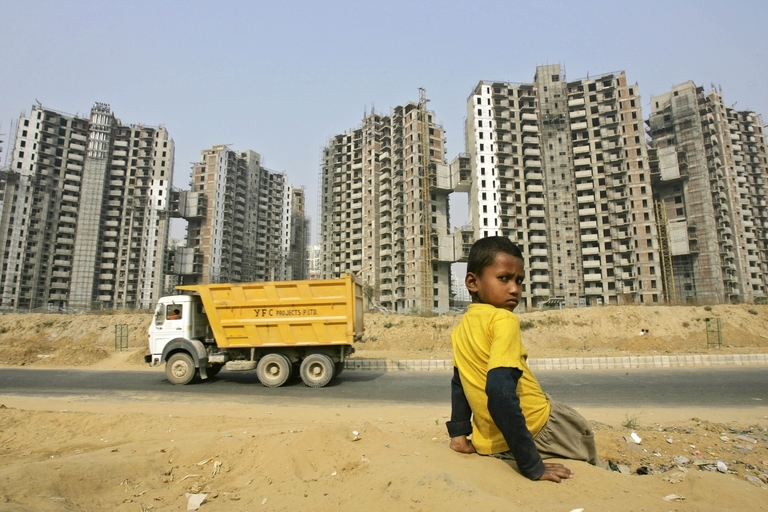India’s wells of death
Children are dying after falling into wells drilled illegally by mafia-style groups to extract scarce water.
![Mahi Upadhyay, who died in a well in northern India [Photo courtesy of Upadhyay family]](/wp-content/uploads/2012/06/2012625193051631734_20.jpeg?resize=570%2C380&quality=80)
Gurgaon, India – The nation is shocked, once again, over the death of a child who fell into an open well and died, hours after celebrating her fourth birthday.
Last Wednesday, Mahi Upadhyay, a cheerful looking daughter of a security guard, fell into a borewell in the Gurgaon district of the northern state of Haryana.
For the following 85 hours, more than 100 rescue workers drawn from the army and fire brigade, worked alongside neighbourhood residents to remove her from the narrow 68ft (21m) well – without success.
On Sunday afternoon, a rescue worker finally pulled out her lifeless, decomposing body from the deep pit – doctors said Mahi had been dead for days, and possibly died from a lack of oxygen within half an hour of falling into the well.
The first police team reportedly arrived 90 minutes after being informed, and the first team of properly equipped rescue workers – army soldiers – arrived nearly seven hours after the fall. Oxygen was pumped into the pit to keep the girl alive from around the same time.
“As an Indian it makes you hang your head in shame,” said software professional Radhika Rangan, who was glued to the TV, watching the uninterrupted live coverage of the rescue operation. Rangan said she had been praying for Mahi, like millions of other Indians.
“This is a country which aspires to be a superpower. And life remains so cheap that children drop into open wells and die. It also proves how callous we as a people have become about our safety and how the officialdom doesn’t care.”
Mahi isn’t the first young victim of a borewell carelessly left open in India.
Illegal drilling
In the past few years, several children have fallen into these open wells, most of which are illegally drilled in order to extract water in areas where groundwater is depleting.
Consider this:
• In 2009, Kirtan Pranami, an 11-year-old boy from Palanpur in Gujarat died after he fell into a 100ft (30m) borewell.
• Within months, two-year-old Darawath Mahesh fell into a 35ft (10m) borewell in Warangal in Andhra Pradesh and died.
• In 2007, Kinjal Man Singh Chauhan, also two years old, fell into a borewell in Madeli in Gujarat and died. The same year, a five-year-old child died after falling into a borewell in Pune in Maharashtra. And another two-year-old boy, Amit, died after falling into a 56ft (17m) borewell near Katni in Madhya Pradesh.
• Last year, a four year-old boy died after falling into a 200ft (61m) borewell in Tirunelvelli in Tamil Nadu. And a three-year-old boy, Ankit, met the same fate after falling into a borewell in Dausa, Rajasthan.
Other children, such as Prince, were luckier. The six-year-old boy fell into a 50ft (15m) borewell in Kurukshetra in Haryana, and was rescued after a two-day-long operation under the glare of news television cameras in 2006.
Soldiers also managed to rescue two-year-old Sonu after he fell into a 15ft (4m) borewell in Agra. And a five-year-old boy was rescued from a 250ft (76m) borewell in Jaipur city in 2009.
If allegations that the well was dug without official permission, Mahi’s death will be another searing example of how children become victims when laws are flouted in India.
The federal Central Ground Water Authority and Haryana’s high court has banned the digging of borewells without permission, considering the sharply declining groundwater in the area.
‘Tanker mafia’
 |
| Officials say they have found and sealed 500 illegal borewells in the Gurgaon region in the past year alone [AP] |
Despite this, local landlords and the “tanker mafia” – a group trading in illegally extracted water – reportedly continue to flout orders, digging borewells illegally and then abandoning them without closing them when they find no water, or when the well dries up.
At the root of India’s borewell deaths, analysts say, is the illegal extraction of groundwater by mafia-style groups, builders and landlords. The gangs ferry the water in tankers to sell to people in water-scarce areas, the builders use it for construction, and landlords extract for use by themslves and their tenants.
“It is a vicious cycle,” Sudipto Roy, a hydrologist, told Al Jazeera. “Such deaths will continue as long as there is a black market in water, water is wasted and therefore, scarce.”
Consider the case of Haryana state in the north of the country, where Mahi and a number of other children have died after falling into open wells.
The Central Ground Water Authority (CGWA) has declared the state as one where groundwater has “depleted significantly”.
Haryana state has 108 clusters of villages across 20 districts. Groundwater in more than half of these clusters are “overexploited”, say experts, pointing to indiscriminate boring for water. The groundwater in 16 further clusters is “critical and semi-critical”, reports the CGWA.
Water in districts such as Gurgaon contains unacceptable amounts of salt, fluoride, iron, and nitrate, say experts, while harvesting rain to recharge the depleting water table is not enough to make up for the deficits.
Senior officials insist that 27 teams have detected and sealed around 500 illegal borewells in the Gurgaon region over the past year. But Mahi’s death shows that the “crackdown” is not enough.
“How many more children have to die before the officials wake up?” asked Gurgaon resident Rangan.
Hours after Mahi’s body was lifted out of the well on Sunday, a 17-year-old boy fell into an open well in Howrah in the eastern state of West Bengal. A team of reportedly ill-equipped rescue workers pulled out the boy’s corpse some 10 hours later.
Until the next child slips into a well and the TV cameras return to record what has become a familiar tragedy, it seems there will be little change in the script.